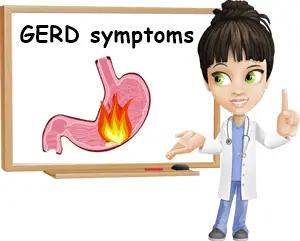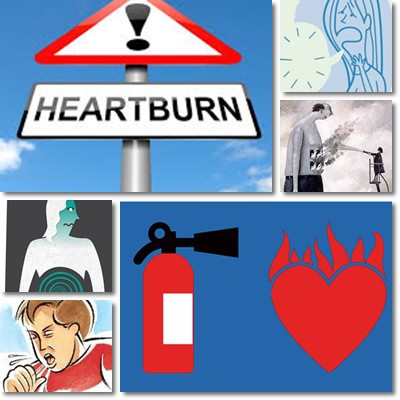Gastroesophageal reflux disease, also called acid reflux disease, constitutes a serious medical condition with deep implications for our health.
Gastroesophageal reflux occurs when stomach contents consisting mainly of gastric and bile acids rise up in the esophagus and cause damage to the sensitive mucosa.
The acids may flow as far as the back of the mouth and elicit a wide variety of highly uncomfortable effects ranging from burning sensation in the throat and chest to nausea, hoarseness and pain.
Symptoms of GERD may vary widely from person to person, but some are common to the majority of sufferers. Treating gastroesophageal reflux is a medical priority because of its potentially dangerous long-term health effects.
If you suspect you are suffering from this condition, it is best to see a doctor for proper diagnosis and treatment. Gastroesophageal reflux disease causes are diverse, ranging from physical abnormalities to poor dietary and lifestyle choices.
Nevertheless, knowing what contributes to the condition is pivotal for curing GERD and preventing future relapses.

Experiencing acid reflux at least once or twice a week is enough for a medical professional to suspect gastroesophageal reflux disease in a moderate to severe form.
However, acid reflux is not the only sign of GERD and some symptoms may be less evident than others, or at least not the kind of symptoms one would normally associated with reflux disease or stomach acidity.
Read below and find out what the most common signs and symptoms of gastroesophageal reflux disease are.
1) Acid reflux
Acid reflux is when stomach acids, mainly gastric and bile acids, flow back into the esophagus and cause a painful burning in the throat and chest and overall discomfort.
The burning sensation may be more or less pronounced. While at first acid reflux only irritates the esophagus, repeated and severe flareups may lead to tissue damage and scarring. If left untreated, the condition may encourage esophageal cancer.
An immediate and visible effect of acid reflux is heartburn or chest pain and burning. From my experience, acid reflux can get so bad it can keep you awake at night for hours at a time.
2) Heartburn and chest pain
The painful burning sensation in the chest caused by gastroesophageal reflux is actually the stomach acid burning the esophagus. It’s called heartburn because of the proximity of the heart which makes it easy for one to mistake stomach acidity for heart problems such as angina and heart attack.

3) Regurgitation and bad taste in the mouth
These are two of the most common symptoms of gastroesophageal reflux disease. Gastric and bile acids rise into the esophagus and may go as far as the back of the mouth, which is basically stomach contents being regurgitated.
This irritates the throat and causes an unpleasant bad taste in the mouth. The taste can be sour, bitter or acidic. When it happened to me, I experienced a highly acidic, almost burning taste.
4) Burping and excess salivation
Repeated burping is common after eating troublesome foods or after heavy meals and is usually a sign of gastroesophageal reflux. Excess salivation is not the most noticeable symptom, but also occurs in GERD and represents our body’s attempt to clear away or wash down the stomach acids flowing back into the esophagus and causing it to become inflamed.
5) Pain and difficulty swallowing (dysphagia)
Because of the damage caused by gastric acid rising into the esophagus, people with GERD may experience difficulty swallowing food. The feeling of food stuck in the throat is also common because of the inflammation of the esophagus.
6) Sore throat and hoarseness
Hoarseness and sore throat are rather atypical symptoms in the sense that we might not normally attribute them to acid reflux.
When the stomach acids flow back into the esophagus, not only do they cause inflammation that results in soreness, but they may also reach the vocal cords and cause hoarseness.
7) Coughing and wheezing
Both symptoms are atypical and are often reported by children. Both can be quite severe and may encourage asthma episodes in children as well as in adults. It has been suggested that energetic coughing can stimulate the nerves in our thoracic cavity and alter normal breathing reflexes, potentially leading to asthma.
Another theory is that when gastric acid flows back into the esophagus, the airways may narrow automatically in an attempt to stop the acid, thus affecting breathing and increasing the risk for an asthma episode.
It has been reported that improving GERD symptoms may help reduce the frequency of asthma episodes, suggesting that acid reflux and asthma may be correlated.
8) Pain after eating
I often experienced pain in the stomach area following a meal because of my acid reflux disease. I was told by my doctor that it was caused by eating large meals at once or foods that were too fatty, both of which triggered my acid reflux.
I also noticed that certain foods such as matured cheeses and whole milk, lemons, vinegar and raw cabbage had the same effect on me.
9) Nausea and vomiting
Nausea that installs right after a meal may be a sign of gastroesophageal reflux disease. Vomiting is especially common in young children and is a slightly atypical GERD symptom. Because both are common in a wide range of conditions and diseases, your doctor might look for other, more typical symptoms when trying to diagnose you.
10) Hiccups
I occasionally experienced hiccups when I was dealing with acid reflux. I noticed they occurred either after a plentiful meal or before eating, when my stomach was completely empty. In both cases, I experienced severe stomach acidity before they occurred. Once I learnt which foods were good for me and which not and I adjusted my diet accordingly, my hiccups disappeared completely.
11) Laryngospasms
Gastroesophageal reflux disease causes the throat to become irritated and dry, which favors laryngospasm episodes. Drinking water can help wash down the stomach acids, calm the throat irritation and combat dryness, possibly preventing laryngospasms. However, the more severe the stomach acidity, the more likely you are to experience laryngospasms.
Conclusion
There isn’t really an instant cure for gastroesophageal reflux disease, but rather a combination of treatment options which stop acid reflux from damaging tissues further, and natural remedies which promote the recovery of the damaged tissues.
What I can tell you from experience is that it takes some work to figure out what foods you should keep eating and what food you should avoid because not all gastroesophageal reflux disease remedies work for all of us in the same way.
Symptoms tend to become less and less frequent, but it will take some time for them to disappear completely and only then can the real healing begin. Learning to manage acid reflux can be a truly liberating experience that empowers us to take more control of what we eat, drink and do and become more aware of what our body needs from us in order to keep us healthy and happy.
